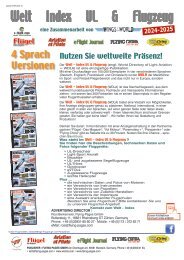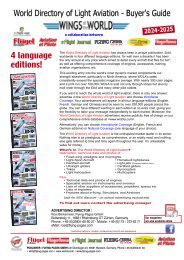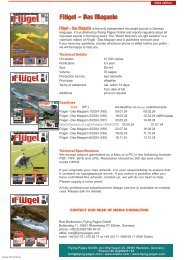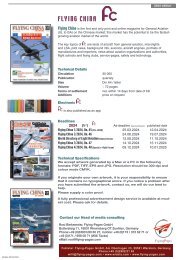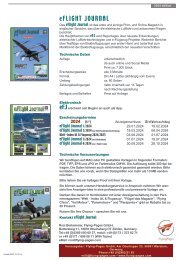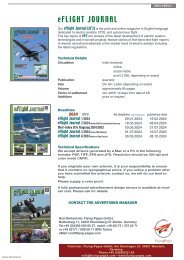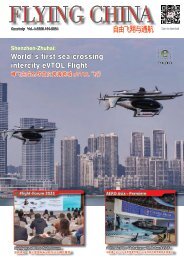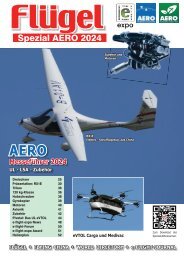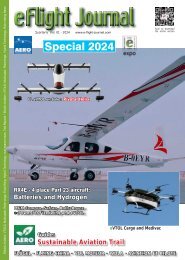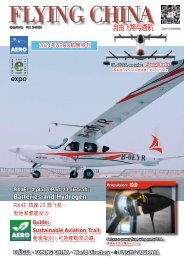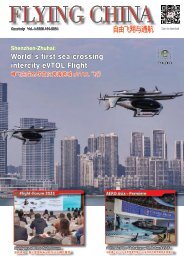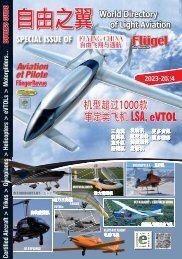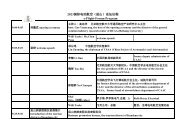eFlight Journal 02-2020
E-Flight Journal 2-2020
E-Flight Journal 2-2020
- No tags were found...
Create successful ePaper yourself
Turn your PDF publications into a flip-book with our unique Google optimized e-Paper software.
e Aviation Talk<br />
Pipistrel’s<br />
eVTOL design<br />
concept.<br />
There<br />
will be<br />
manned and<br />
unmanned<br />
Aircraft with<br />
a similar<br />
concept.<br />
the working temperature of battery cells on Alpha Electro<br />
is limited to -5° Celsius which is translated roughly into<br />
-15° Celsius ambient temperature.<br />
eFJ: Do you - Pipistrel - produce the battery packing<br />
by yourself?<br />
Tine: Yes, Pipistrel designs and produces all electric<br />
components in-house including the battery packing.<br />
eFJ: Does Pipistrel provide other aircraft OEM the<br />
electric propulsion unit as a complete package?<br />
Tine: The short answer is yes. Because the motor is certified,<br />
OEM just needs to conduct the integration certification<br />
like any other engine installation. As for the battery,<br />
the OEM may go to the regulator to certify the battery<br />
with their airframe because there is no stand-alone type<br />
certification nor TSO specification yet for the battery so<br />
the battery does not carry type certificate itself. We are in<br />
active discussion with EASA for issues like this. Besides<br />
batteries, we are also discussing with EASA for the separate<br />
certification for other components such as BMS.<br />
However if the aircraft OEM decides to use the same<br />
batteries as Velis, the certification process will likely be<br />
much shortened. It is worth noting that the battery packs<br />
on Velis are designed to be a stand-alone component so<br />
when EASA can certify batteries, the battery packs on<br />
Velis can be certified as a separate component and thus<br />
can also be upgraded.<br />
eFJ: Where do you see the battery capacity on pack<br />
level now and in five years?<br />
Tine: Currently we have 180 WH at pack level on the Velis.<br />
To better understand the situation, it’s important to<br />
know many Velis pilots will use the airplane for flight training<br />
operation so affordability and cost are important factors<br />
in consideration of battery use. There are indeed<br />
some battery cells in the market with higher capacity but<br />
they are not economical to operate and to certify. Practically<br />
speaking the pack density may increase 50 % in ten<br />
years and probably 25 % in five years and such batteries<br />
become commercially available for customers by then.<br />
Remember that it takes about one and half years to certify<br />
the battery when it’s commercially available. The aging<br />
test alone takes a minimum of nine months and you simply<br />
cannot accelerate certain process like that.<br />
eFJ: Will the Alpha Electro come to the German market,<br />
or will Pipistrel certify a Velis alike model for the<br />
600 kg category ultralight for Germany?<br />
Tine: The German ultralight regulation requires a maximum<br />
empty weight of 400 kg. Velis, with all the safety<br />
components required by the certification, is a little over<br />
this limit. We are currently carefully studying the option of<br />
removing certain components to lower the empty weight<br />
as well as the price while maintaining the safety of the<br />
airplane. In addition, we can also offer a model called Alpha<br />
Electro LC (liquid cooled) which combines the Alpha<br />
Electro ultralight’s motor with the battery and electrical<br />
system from Velis for other markets with 600 kg regulation.<br />
So we will have three models with similar configuration<br />
to meet different regulation and market demand: Alpha<br />
Electro ultralight, Alpha Electro LC and the certified<br />
Velis which can be used for commercial operation and<br />
EASA private pilot training. Everything considered, Velis<br />
is actually a very competitive model for German market<br />
because when considering the battery as the “fuel” is all<br />
prepaid and the motor’s TBO hours, Velis’ price and operational<br />
cost are very competitive.<br />
24 e Flight <strong>Journal</strong><br />
2 / 2<strong>02</strong>0



